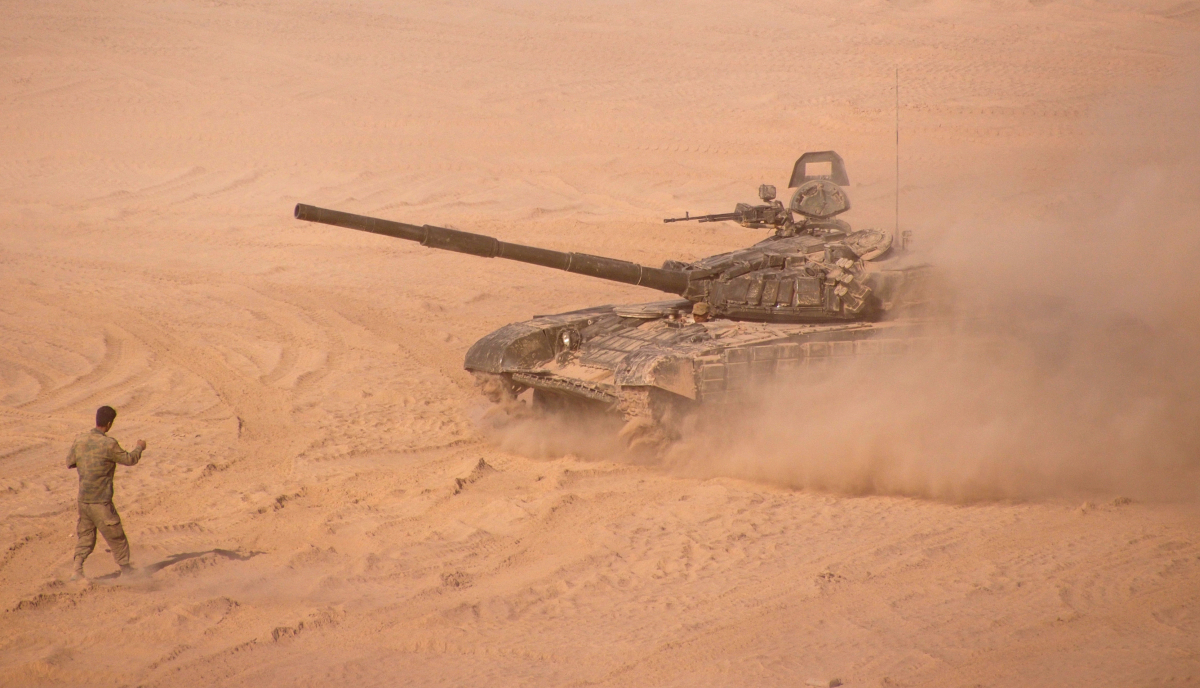The Impact of the Situation in Afghanistan on Regional Security in Central Asia
From the perspective of Central Asian states, the potential for further destabilisation of Afghanistan is seen as a significant regional transnational threat. It would make these countries more susceptible to influence, primarily from Russia, which bases its policy in the region on military power. The withdrawal of U.S. troops from Afghanistan is already being used by Russia, China, and Turkey in propaganda as an example of the lack of American credibility, as well as that of European countries. This situation will limit the prospects for cooperation between the Central Asian republics and the U.S. and the EU in the future.
 Photo: Nozim Kalandarov/TASS
Photo: Nozim Kalandarov/TASS
The countries of Central Asia, especially Uzbekistan, Tajikistan, and Turkmenistan, which border Afghanistan, have been preparing for several months for the Taliban to take power in that country and have been developing working contacts with them. These countries are maintaining their diplomatic presence in Afghanistan, however, they are concerned about the destabilisation of the state under Taliban rule and the resulting increased threat to their security. These neighbouring countries are interested in maintaining pragmatic relations with the new government to counteract destabilisation of the region and continue important infrastructure projects, including the TAPI-Turkmenistan-Afghanistan-Pakistan-India gas pipeline. However, the risk of an escalation of the conflict in Afghanistan between the Taliban forces and the National Front grouped in the Panjshir Valley may adversely affect the status of the Tajik (about 27% of the population) and Uzbek (9%) minorities. Some of their leaders (mainly those in exile in Tajikistan or in the Panjshir Valley) sympathise with the fighters hostile to the Taliban, which may complicate Central Asian states’ ability to cooperate with the Taliban.
Transnational Threats
The greatest threat to the security of Central Asia is the likely increase in the activity of terrorist organisations on Afghan territory. The Taliban, despite declaring they have broken ties with terrorist organisations, still maintain contact with some of them, including Al-Qaida, the Islamic Movement of Uzbekistan, the Islamic Jihad Union, the Islamic Party of East Turkestan and Lashkar-e-Taiba. By taking advantage of Taliban sympathies or at least their limited ability to exercise effective control over the entire country, these groups may intensify training and logistics activities in Afghanistan with the participation of citizens of Central Asian countries. Also, local ISIS cells, which are fighting with the Taliban and one in particular, ISKP, responsible for the suicide bombing at the Kabul airport on 26 August, are interested in exploiting Afghanistan destabilisation. As a result, the operational capabilities of groups hostile to secularised regimes in Central Asian states may increase, which will raise the likelihood of terrorist attacks on their territory. Central Asian states are also concerned about how the internal destabilisation of Afghanistan might facilitate the influx of foreign fighters onto their territory. This would encourage the renewal of ties between the Taliban and militants from Russia and Central Asia present in Afghanistan with other groups from the Middle East and South Asia, existing since the jihad in Afghanistan in the 1980s and in Syria and Iraq in 2013-2019. A group particularly exposed to radicalisation and joining these groups is already in Afghanistan—labour migrants from Central Asia who were forced to leave the Russian market because of the COVID-19 pandemic.
Uzbekistan and Tajikistan have hosted several thousand Afghan refugees, but they do not have the means to provide them with adequate assistance, as the countries are already struggling with high unemployment and a deterioration in the living conditions of their own citizens. Therefore, they will seek to force Afghan refugees and migrants to return to Afghanistan or to Russia or Turkey (via existing migration routes), where they then may go to the EU (both Russia and Belarus are running migrant transports to simulate a migration-management crisis on the border of countries on NATO’s Eastern Flank).
A consequence of the sharp reduction of foreign financial support for the government in Kabul and the deterioration of the living situation of Afghans, the production of heroin and opium likely will increase. According to estimates by the UN Office on Drugs and Crime (UNODC), this production accounts for around 80% of the global opiate market. Afghan drug smuggling routes to Europe run through Central Asia (the “northern route” accounts for around 40% of Afghan opiate exports), and then through Turkey or Russia. Central Asian states fear that the Taliban, contrary to their assurances, will not combat the production and export of Afghan opium, which may result in their greater availability in the region.
With the destabilisation of Afghanistan and the increased risk of transnational threats, countries in the region have been mobilising troops and strengthening their southern borders for several months now. There, they cooperate with Russia and the Collective Security Treaty Organisation (CSTO). In 2021, in connection with the situation in Afghanistan, joint military exercises were the largest in years. As part of CSTO and in cooperation with countries outside it, manoeuvres with the participation of troops from Russia, Tajikistan, and Uzbekistan took place in Tajikistan in August this year.
Foreign Influence
The potential deterioration of regional security in Central Asia creates challenges for Russia, China, and Turkey, which are heavily involved in countries in the region. The export of radical Islamic ideology from Afghanistan to Central Asian states threatens Russia, the largest labour market for migrants from this region, as well as China, which is involved economically in the region and fearful of increased activity by Uyghur terrorists, and Turkey, an important direction of economic migration from Central Asia.
At the same time, all three perceive the deterioration of regional security as an opportunity to strengthen their influence in Central Asia. Russia will use the threats arising from the destabilisation of Afghanistan to increase its military presence and put political pressure on Central Asian states. It will press Uzbekistan to join the Eurasian Economic Union (EEU) or the CSTO. Russia will also intensify joint manoeuvres and exercises with CSTO members, which include Kazakhstan, Kyrgyzstan, and Tajikistan.
China, in order to protect its western borders—including those directly with Afghanistan—and Chinese investments in Central Asia, will strengthen its involvement in the area of regional security. This can mean both an increase in the use of Chinese private military companies (PMCs) and strengthening the two existing military bases (in Tajikistan and Afghanistan).
Turkey also will use the greater possibility of cooperation in this field with the countries of the region to support the protection of its borders with Central Asian states and in taking stabilisation measures in Afghanistan itself. For this purpose, it is ready to use its PMCs, including for the protection of critical infrastructure such as the TAPI gas pipeline.
Conclusions and Perspectives
The takeover of power in Afghanistan by the Taliban is perceived by Central Asian states as a risk of increased transnational threats, which makes them more susceptible to outside influence, especially of Russia, with its military instruments, as well as China and Turkey. The withdrawal of U.S. troops from Afghanistan is already being used in propaganda to muddy the credibility of the Americans and European countries, which will hamper cooperation between the Central Asian republics and the U.S. and the EU. The countries of the Eastern Flank, including Poland, should prepare for Russia and Belarus to make greater use of seemingly uncontrolled migration from Central Asia and Afghanistan as an element of political pressure, even though the scale is relatively small.
The EU can strengthen cooperation with Central Asian countries on border controls and countering drug trafficking. An important role in the region is reserved for the EU’s Border Management in Central Asia (BOMCA) and Central Asia Drug Action Programme (CADAP), whose mandate and funding may need to be strengthened. When chairing the OSCE in 2022, Poland may initiate actions to stabilise the border between Central Asia and Afghanistan. Support from other Member States for the protection of the borders of countries in the affected region under an OSCE mandate would limit the instrumentalisation of regional security issues by Russia and/or China.


